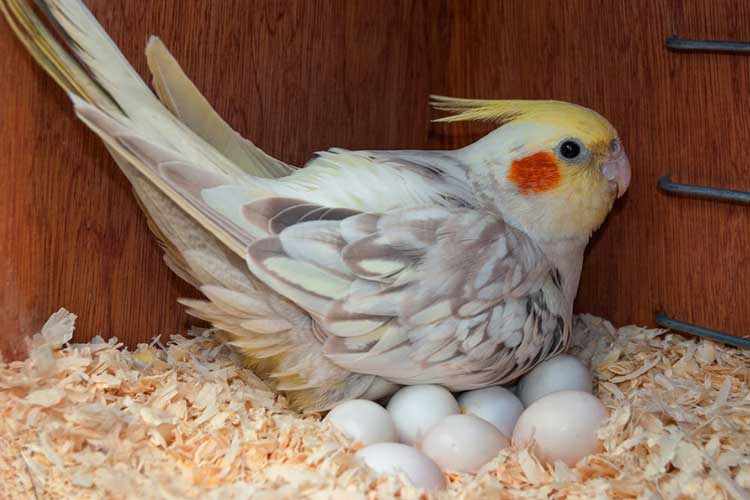Cockatiels are known to be one of the most friendly birds found in nature. And when your pretty bird lays eggs, your responsibility towards it and its egg increase significantly.
A common concern is how to make sure cockatiels hatch their eggs efficiently. Several factors can affect the reasons why your cockatiel may not be reproducing. Moreover, the egg itself may not hatch at times for various reasons.
In this cockatiel eggs guide 101: all your questions answered to the point where you don’t have to look anywhere else. We will also discuss several key pieces of information here. So, continue reading the article till the end!
When Is The Cockatiel Mating Season? Do They Need To Mate?
The cockatiel mating season typically begins in late autumn and goes well into spring. Oftentimes, the season also extends to the early summer. This is because the weather and temperature in these timeframes of the year are mild.
Even though the case is similar for pet birds, they can reproduce all year round as well. In these cases, the pet birds will require a special or additional light for about 12 to 14 hours every day.
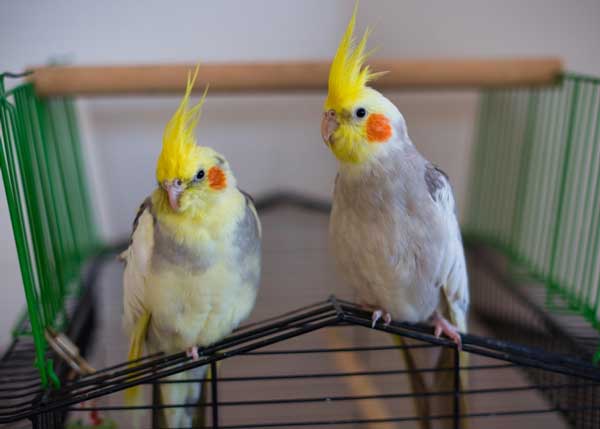
One of the most surprising facts about cockatiels is that females do not necessarily need a mate to lay eggs. Without a mate or partner, female cockatiels can lay eggs at least once every year.
However, these eggs do not hatch into chicks. These are infertile cockatiel eggs, as a male cockatiel is required for fertilization.
How To Prepare Cockatiels For Breeding?
Proper preparation before allowing your cockatiels to mate is important. This will ensure proper health and affects the overall well-being of the eggs. Let us take a look at how to prepare cockatiels before breeding.
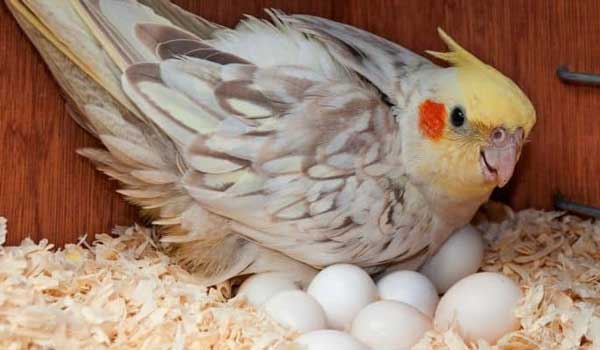
1. Provide a healthy diet for your birds
Ensure your birds are receiving a balanced diet of seeds, pellets, fresh vegetables, and fruits.
2. Create a suitable breeding environment
Provide a nesting box, adequate perches, and other items to make your cockatiels feel comfortable.
3. Monitor your birds
Keep a close eye on your birds to ensure they are in good health and are getting along with each other.
4. Take the birds to the vet
Get the birds checked out by a professional vet. This will help to ensure that the cockatiels do not have any diseases or health problems.
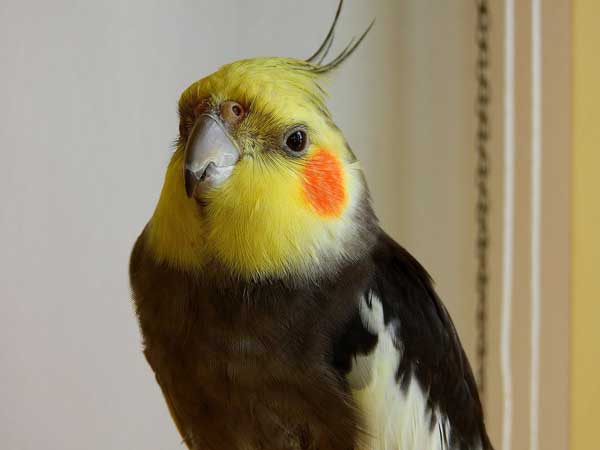
5. Give them plenty of privacy
Cockatiels need some time alone and away from their mate to bond and breed. Provide them with a separate area or cage where they can have privacy when needed.
6. Provide the right temperature
The right temperature is essential for breeding. Make sure the cage is located in an area that is not too hot or too cold.
7. Allow the birds to form a bond
Provide plenty of time for your birds to bond before breeding. This can be done by allowing them to spend time together in the same cage or by placing them in a larger cage so they can interact.
9. Provide a nesting area
Provide a nesting area for your cockatiels to lay their eggs. This should be a dark, quiet area but big enough for proper movement.
What To Feed Cockatiels When Laying Eggs?
When cockatiels are laying eggs, it is important to provide them with a balanced and nutritious diet. Ensuring this proper diet will help your cockatiel to lay eggs safely and hatch into healthy chicks. Take a look at what to feed cockatiels.
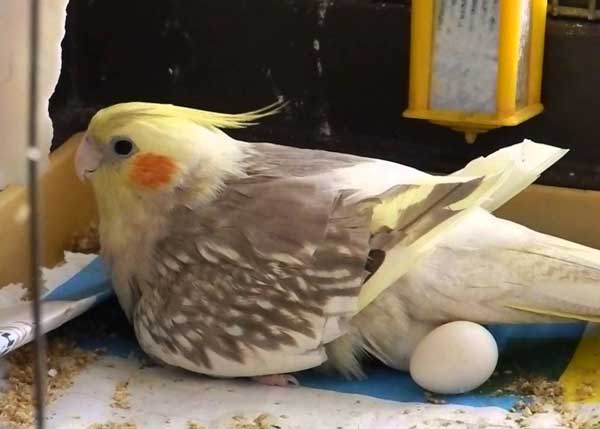
Commercial Bird Pellet
One of the major changes that you must bring to your cockatiel’s diet is the food pellet. The majority of pet owners rely on bird seeds more than bird pellets. But commercial bird pellets help to meet all sorts of nutritional requirements of the cockatiels.
Not only that, but it also has a low-fat concentration and helps to prevent fatty liver issues.
Provide Soft Food
Soft food is an essential part of the cockatiel diet. It is a great choice for breeding or pregnant cockatiels. Soft food should be provided, including cooked oatmeal, boiled peas, moist whole wheat bread, cooked rice, and so on.
Give Fresh Fruits And Vegetables
Fruits and vegetables are packed with nutrients and are a great way to meet the nutrition demands of a cockatiel. Calcium, vitamins, and minerals in fresh produce provide female pregnant cockatiels with the food values they require.
Provide fresh fruits such as bananas, apples, oranges, etc. And for vegetables, go for leafy greens, celery, etc.
Include Dietary Supplements
Dietary supplements are an excellent way of providing cockatiels with all the minerals and nutrients they require. Provide cockatiel breeding formula after consulting a vet.
Clean Water
Last but not least, make sure to provide clean water to your cockatiels. Change the water in the vessel every day, and make sure to keep the cage clean as well.
Cockatiel Egg Laying Signs
Before the cockatiel lays eggs, there will be a few obvious signs that owners will notice. Take a look at these signs:
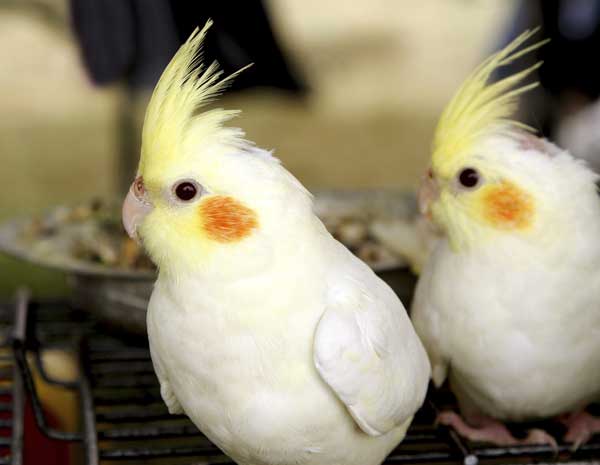
- Pregnant cockatiels will gain weight
- The abdomen and lower region of the body will get bigger and firmer
- Cockatiels will start drinking more water than usual
- The female pregnant cockatiel will attempt to build a nest from toys, perch, etc.
- Female birds will become protective of their cage
- Cockatiel dropping size will be larger and loose
How Do I Take Care Of A Cockatiel Egg?
Taking care of a cockatiel egg properly ensures it hatches safely. Take a look at how to take care of an egg.
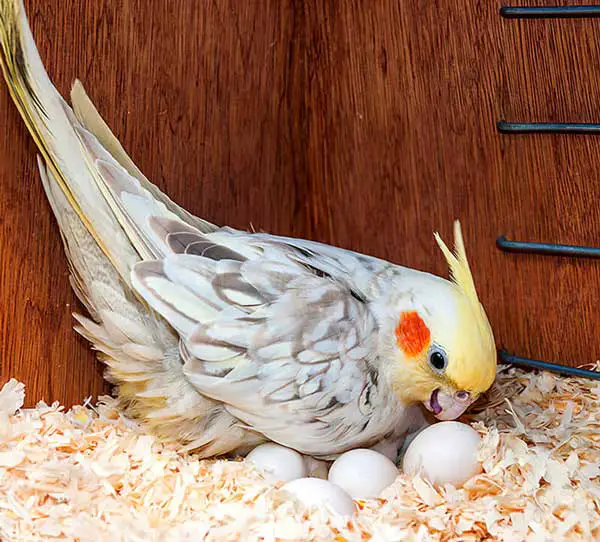
- Make sure your cockatiel eggs are kept in a warm and humid environment. The temperature should range from 80-90°F with a humidity level of 60-70%
- Provide a nest box or some other nesting material, such as a shallow bowl lined with soft towels
- Keep the eggs in the same position and avoid disturbing them until they hatch. Do not try to remove or disturb the cockatiel sitting on eggs
Make sure the cockatiel eggs are kept clean and free from any debris or dirt. Ensure that they are turned at least twice a day to ensure even warming
- Inspect the eggs every day to be sure they are progressing properly. Contact a vet immediately if you see any discoloration or other signs of problems
- Once the chicks have hatched, provide them with pellets, fruits, and vegetables
How Can You Tell If A Cockatiel Egg Is Good? Why Are They Not Hatching After 21 Days?
If the egg is not hatching within the timeframe, you can check its fertility. The method is known as candling cockatiel eggs. In this method, hold the egg in front of a flashlight or candle to see inside it.
When the light travels through the egg, you will see the yolk and the situation inside the egg. The egg is fertile if you notice movement along with blood vessels inside. In case there are no blood vessels or you notice a blood ring inside, then the egg is infertile.
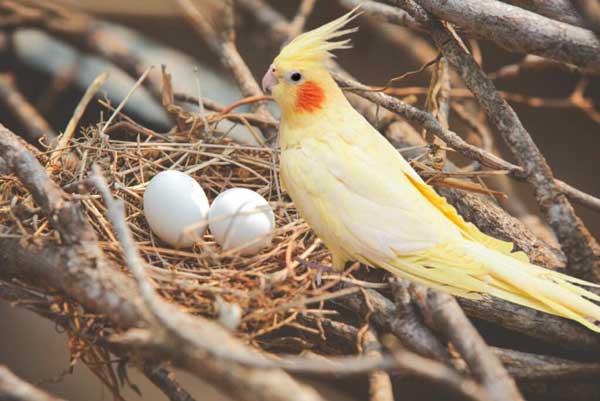
It also matters to check if cockatiel eggs fertile or infertile. Unfortunately, not all cockatiel eggs meet the daylight of this world. In case cockatiel eggs not hatching after 21 days, then they are infertile.
This typically happens due to health problems and improper diet. Make sure you take the bird to a vet and take proper care to ensure a balanced diet.
How To Hatch Cockatiel Eggs At Home?
Often, the cockatiel doesn’t sit on eggs, preventing them from hatching. In cases like these, you can hatch the eggs at home easily. Check out the steps on how to hatch cockatiel eggs.
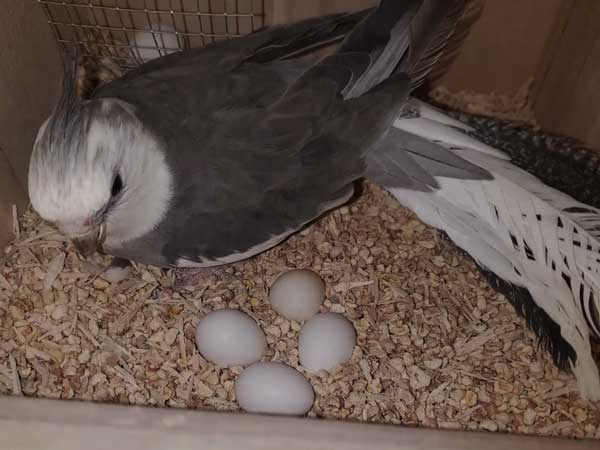
1. Prepare The Nest
Put a flat container, such as a plastic storage bin, at the bottom of the cage. Line the container with at least two inches of shredded paper, wood shavings, or straw. Put the egg in the nest, positioning it, so the rounded side is up.
2. Incubate The Egg
Cover the nest with a cloth or towel to provide a dark, warm environment. The temperature should be between 90-95 degrees Fahrenheit (32-35 degrees Celsius). Check the egg daily, but do not turn it or move it around.
3. Hatch The Egg
After 18-21 days, the egg should hatch. The baby cockatiel will be wet, blind, and covered in a thin layer of down.
4. Care For The Baby
The baby will need to be kept in a warm, draft-free environment. Provide a shallow bowl of water for drinking and a diet of soft foods such as mashed vegetables and cooked egg yolks.
FAQs
Still, got questions about the topic? Check out the most frequently asked questions here!
If the cockatiel doesn’t sit on the eggs, it needs an incubator to hatch. If you put the egg inside an incubator, it is needed constantly until the egg hatches.
Typically, cockatiels lay about 12 eggs every year. This happens in two clutches, and each clutch contains a maximum of 6 eggs.
For healthy breeding, cockatiels must reach a certain age. For male birds, the cockatiels must be about 18 months old. And the female cockatiels should be about two years of age before breeding.
Typically, it takes the egg about 18 days to hatch. However, if the cockatiel doesn’t sit on the egg within time, it can take a few days longer to hatch. On top of that, dead cockatiel eggs will not hatch no matter how long they are incubating.
Conclusion
Taking care of cockatiel eggs properly ensures that healthy babies hatch. It is also essential to take proper care of the pregnant cockatiel to prevent future diseases and other health problems.
We tried to bring you the ultimate cockatiel eggs guide. If you need any help, use this guide to learn the details of caring for pregnant birds.
